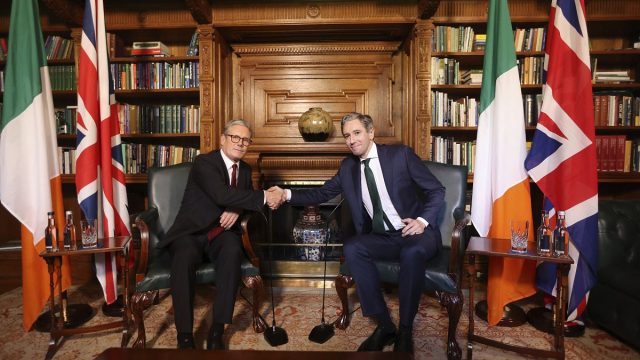Relations between the two countries have been strained since the United Kingdom voted to leave the European Union, which has complicated some political structures in Northern Ireland, which is part of the United Kingdom.
The British Prime Minister, Keir Starmerhas met in Dublin with his Irish counterpart, Simon Harrisin a visit described as a reset between both countries. Starmer’s trip is the first by a British leader to Ireland in five years and is a further sign that both want deepen their relations in economic and security matters.
Harris was the first international leader Starmer welcomed after the Labor Party’s landslide election victory on July 4. “Today is a really significant day because we have made clear our ambition to restore the relationship and today we are taking it forward,” Starmer said.
“We are clear that for March we want to hold a summit to show the performance of this and then annual summits.
“I know that as two new leaders of our respective countries, we have both said that we really want putting British-Irish relations on a new path. And I really appreciate the time you’ve given us since you took office,” Harris told Starmer.
Tense relations since Brexit
Relations between the two countries have been tense since the The United Kingdom voted in 2016 to withdraw from the European Unionespecially in light of how it affected the political structures of Northern Ireland, which is part of the United Kingdom.
When the United Kingdom left the bloc, the British Government and the EU agreed to keep the Irish border free of customs posts and other controls because an open border is a key pillar of the peace process that ended 30 years of violence in Northern Ireland.
Starmer said restoring relations had to encompass the Good Friday agreement, the historic 1998 agreement that ended the conflict known as the Troubles.
“I take our joint role in this very seriously. And I’ve been very clear about that for many, many years and I renew that commitment here today,” Starmer said.
Starmer stated that now the opportunity presents itself to further consolidate relations, both with Ireland and the EU. He has said the UK will not seek to rejoin the EU under his leadership, nor the bloc’s single market and frictionless customs union.
However, he has made it clear that wants to renegotiate elements of the post-Brexit trade agreement with the EU in order to boost growth, part of what he called “the broader EU reset.”
“We are also resetting our relationship with the EU and I have made it very clear that I want a closer relationship with the EU,” he said.
“Of course, on security and defence, but also on trade, reducing friction, and any company here in Ireland will tell you that reducing friction helps, so we want to reset that relationship.”
Starmer has been touring the EU capitalsincluding Paris and Berlin, since their election victory in the hope of generating the goodwill needed to move forward on that front, as well as to “stand together” on international issues such as the Ukraine war.
Starmer and Harris took part in a business roundtable in Dublin to explore how a “reset” in relations can benefit trade. The economic relationship is around 120,000 million euros and supports thousands of jobs on both sides of the Irish Sea.







